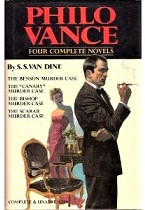
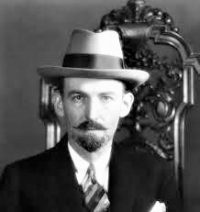 Philo Vance (1943-45, 1945, 1946-52) aired “The Midget Murder Case” several times, this broadcast airing on September 7, 1948 as the third time in the 1946-48 syndicated run (the first being on November 21, 1946 and the second coming in May of 1948, a few months prior to this rebroadcast). The number of total episodes is unknown due to the lack of information on the 1943-45 run, though a good estimate combining the other two runs comes close to 120, though numbers vary. This is but the fourth episode of this well received program we have offered since 2018, the last being in April of this year. For newcomers and for those needing to refresh their memories, we reprise (with minor variation) the initial background information.
Philo Vance (1943-45, 1945, 1946-52) aired “The Midget Murder Case” several times, this broadcast airing on September 7, 1948 as the third time in the 1946-48 syndicated run (the first being on November 21, 1946 and the second coming in May of 1948, a few months prior to this rebroadcast). The number of total episodes is unknown due to the lack of information on the 1943-45 run, though a good estimate combining the other two runs comes close to 120, though numbers vary. This is but the fourth episode of this well received program we have offered since 2018, the last being in April of this year. For newcomers and for those needing to refresh their memories, we reprise (with minor variation) the initial background information.
The character of detective Philo Vance was the brainchild of S. S. Van Dine (pseudonym of Willard Huntington Wright, 1888-1939, photo top right). Wright would pen 12 Philo Vance novels between 1926 and 1939, the first of which was The Benson Murder Case (1926) and the last being The Winter Murder Case which he finished shortly before his death in April of 1939. Vance was very much in the mold of the “gentleman detective” or what would come to be known as the “soft-boiled” variety of detective. He has much in common with Sherlock Holmes and Nero Wolfe in that he was in possession of a giant intellect, though his arrogance and aloofness surpassed that of the former detectives and put many off. As Wright himself wrote of his character (via Van Dine) in The Benson Murder Case: “Vance was what many would call a dilettante, but the designation does him an injustice. He was a man of unusual culture and brilliance. An aristocrat by birth and instinct, he held himself severely aloof from the common world of men. In his manner there was an indefinable contempt for inferiority of all kinds. The great majority of those with whom he came in contact regarded him as a snob. Yet there was in his condescension and disdain no trace of spuriousness. His snobbishness was intellectual as well as social. He detested stupidity even more, I believe, than he did vulgarity or bad taste. I have heard him on several occasions quote Fouché’s famous line: C’est plus qu’un crime; c’est une faute. And he meant it literally.
“Vance was frankly a cynic, but he was rarely bitter; his was a flippant, Juvenalian cynicism. Perhaps he may best be described as a bored and supercilious, but highly conscious and penetrating, spectator of life. He was keenly interested in all human reactions; but it was the interest of the scientist, not the humanitarian.
“Vance’s knowledge of psychology was indeed uncanny. He was gifted with an instinctively accurate judgement of people, and his study and reading had coordinated and rationalized this gift to an amazing extent. He was well grounded in the academic principles of psychology, and all his courses at college had either centered about this subject or been subordinated to it…
“He had reconnoitered the whole field of cultural endeavor. He had courses in the history of religions, the Greek classics, biology, civics, and political economy, philosophy, anthropology, literature, theoretical, and experimental psychology, and ancient and modern languages. But it was, I think, his courses under Münsterberg and William James that interested him the most.”
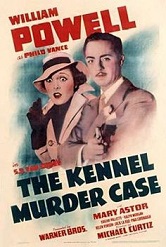 Unfortunately (or fortunately as is your preference), the radio and film portrayals of Vance toned down his aloof disdain for the common man and made him more likable for audiences. Speaking of the films, there were a dozen adapted from 1929 through 1940. There were a trio of later films made in 1947 but they had nothing to do with the novels and little relationship to the Vance character. Of the first five films (two in 1929, two in 1930–one being The Benson Murder Case, and the fifth in 1933) William Powell starred in four, while future Sherlock Holmes film star of the 1940s, Basil Rathbone, starred in the fourth (The Bishop Murder Case, 1930). The final Powell role as Vance came with 1933’s The Kennel Murder Case. Such was Powell’s popularity and connection with the movie-going audience that in 1934, barely a year later, he would co-star with Myrna Loy in the first of the classic films adapted from Dashiell Hammett’s The Thin Man detective novels and stories.
Unfortunately (or fortunately as is your preference), the radio and film portrayals of Vance toned down his aloof disdain for the common man and made him more likable for audiences. Speaking of the films, there were a dozen adapted from 1929 through 1940. There were a trio of later films made in 1947 but they had nothing to do with the novels and little relationship to the Vance character. Of the first five films (two in 1929, two in 1930–one being The Benson Murder Case, and the fifth in 1933) William Powell starred in four, while future Sherlock Holmes film star of the 1940s, Basil Rathbone, starred in the fourth (The Bishop Murder Case, 1930). The final Powell role as Vance came with 1933’s The Kennel Murder Case. Such was Powell’s popularity and connection with the movie-going audience that in 1934, barely a year later, he would co-star with Myrna Loy in the first of the classic films adapted from Dashiell Hammett’s The Thin Man detective novels and stories.
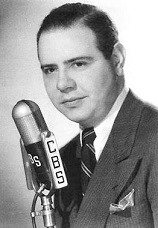 For the 1945 summer replacement series, native-born Puerto Rican actor (Tony {1947} and Oscar {1950} award winner, both for his portrayal of Cyrano de Bergerac) Jose Ferrer (1912-1992), would play Vance, and his portrayal is considered by critics and lovers of the series to be one of the best. For the much longer 1946-52 run, Jackson Beck (1912-2004, photo at right) would play Vance, and many consider his performance to be the penultimate one, Ferrer notwithstanding. Beck is also known as the announcer for the much beloved The Adventures of Superman radio series (1940-51), and for the voice of Bluto in the series of short animated Popeye features begun in 1933 and shown in theaters across the country.
For the 1945 summer replacement series, native-born Puerto Rican actor (Tony {1947} and Oscar {1950} award winner, both for his portrayal of Cyrano de Bergerac) Jose Ferrer (1912-1992), would play Vance, and his portrayal is considered by critics and lovers of the series to be one of the best. For the much longer 1946-52 run, Jackson Beck (1912-2004, photo at right) would play Vance, and many consider his performance to be the penultimate one, Ferrer notwithstanding. Beck is also known as the announcer for the much beloved The Adventures of Superman radio series (1940-51), and for the voice of Bluto in the series of short animated Popeye features begun in 1933 and shown in theaters across the country.
“The Midget Murder Case” is an interesting puzzle for Vance to solve. It involves two murders–one by a midget gun and the other by strangulation. The suspects–each with motive and opportunity–are a midget, a giant, a trapeze artist, and a magician. Have fun with this one.
Play Time: 26:44
{With summer vacation just concluded and another school year staring them in the face, the neighborhood gang was in no mood for school books quite yet, so found themselves at the nearby newsstand hunting for more exciting reading fare more than usual the first week of school. Astounding (1930-present, now Analog) always topped someone’s list and this issue–with its eerie, alien landscape–needed no text to capture the interest of the reader. It was a monthly in 1948. fantastic Adventures (1931-53), like many another SF pulp of its time, was no stranger to the colorful, garish cover created to entice youngsters seeking escape from their mundane world. It was a monthly in 1948. Thrilling Wonder Stories (1936-1955), like fantastic Adventures, also never shied away from squiggly wiggly aliens and half clad young women on its covers. That said, it attracted some of the most revered authors and now classic pulp stories beloved by generations of fans, stories appreciated not for their scientific accuracy or deep characterizations but for their wild and unfettered imagination. TWS was a bi-monthly in 1948.]
[Left: Astounding, Sept. 1948 – Center: fantastic Adventures, Sept. 1948 – Right: TWS, Aug. 1948]
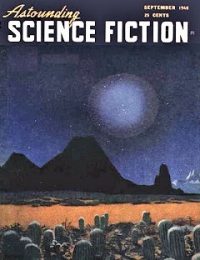
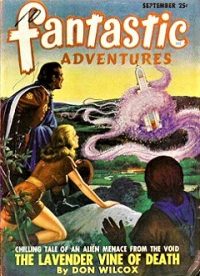
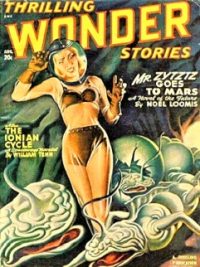
To view the entire list of weekly Old Time Radio episodes at Tangent Online, click here.